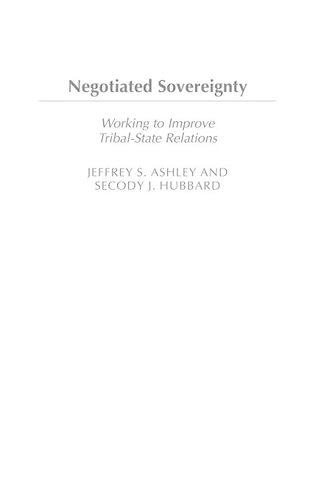
Negotiated Sovereignty: Working to Improve Tribal-State Relations
(Hardback)
Publishing Details
Negotiated Sovereignty: Working to Improve Tribal-State Relations
By (Author) Jeffrey S. Ashley
By (author) Secody J. Hubbard
Bloomsbury Publishing PLC
Praeger Publishers Inc
30th November 2003
United States
Classifications
Tertiary Education
Non Fiction
323.1197073
Physical Properties
Hardback
144
Description
Ashley and Hubbard examine ways that tribal/state relations can be improved in the United States. While the long history of tribal-state relations point to the need for better cooperation, they contend that the first and most vital step is a greater understanding of the role that tribal governments play in the federal system. All too often, they assert, tribes are overlooked as viable political entities with unique legal and political status. They begin by providing background information needed for an understanding of the position that tribal governments hold in the broader United States system. Often overlooked is that tribal governments are, by legal standards, equal to or greater than states. The federal/tribal/state order of primacy must be established in order to understand state/tribal intergovernmental relations. Ashley and Hubbard then provide case studies necessary to provide evidence of both positive and negative tribal/state relations. Following a brief background of the tribe in questionwhere they are located, any pertinent treaty informationthey examine instances over time where this particular government has been in conflict or concert with the state in which they currently reside. This lays a foundation for understanding current relations. They then look at the level of cooperationor lack thereofbetween the tribe and the state across key areas of policy making and implementationair pollution control, water management, and law enforcement. Through this they pinpoint common themes that facilitate or work against cooperative efforts. They conclude by proposing an alternative model for understanding tribal/state relations and offer an alternative approach for both sides when dealing with one another; one designed to improve cooperative handling of issues.
Reviews
[E]xamines the legal background and history of intergovernmental relations and attempts to isolate variables critical to forging new relationships from a cooperative standpoint. The authors discuss the importance of building a foundation of trust.-Multicultural Review
Ashley and Hubbard have provided a valuable examination of tribal-state relations....succinctly explain the evolving relationship between sovereign tribes and states, informative for students and professors alike....the clear message is that negotiations have to deal with one issue at a time while respecting the other's sovereignty in face-to-face meetings, beginning with the technocrats and working up to the political leaders. Highly recommended. All academic levels and collections, particularly Indian studies program collections.-Choice
"Examines the legal background and history of intergovernmental relations and attempts to isolate variables critical to forging new relationships from a cooperative standpoint. The authors discuss the importance of building a foundation of trust."-Multicultural Review
"[E]xamines the legal background and history of intergovernmental relations and attempts to isolate variables critical to forging new relationships from a cooperative standpoint. The authors discuss the importance of building a foundation of trust."-Multicultural Review
"Ashley and Hubbard have provided a valuable examination of tribal-state relations....succinctly explain the evolving relationship between sovereign tribes and states, informative for students and professors alike....the clear message is that negotiations have to deal with one issue at a time while respecting the other's sovereignty in face-to-face meetings, beginning with the technocrats and working up to the political leaders. Highly recommended. All academic levels and collections, particularly Indian studies program collections."-Choice
Author Bio
JEFFREY S. ASHLEY is Assistant Professor of Political Science, Saginaw Valley State University, Saginaw, Michigan. In addition to essays in published collections, he is the co-author, with Zachary Smith, of Groundwater Politics and Policy in the West. SECODY J. HUBBARD currently works for the United States Environmental Protection Agency (USEPA) in the Office of Policy and Management.
